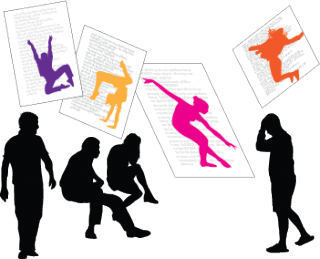Autism
Awkward in Person, Graceful on the Page
In text and online, autistic people communicate…just like we do.
Posted July 6, 2013

Autistic people are eloquent and graceful on the page and screen
We present differently online than we do in person. Anyone who's tried online dating has seen that difference, or been it. For most of us, the transformation happens because the internet allows us to be something we’re not. For autistic people, it’s because the internet allows them to be something they are.
Online communication loses the awkward
A large proportion of the smart, eloquent, funny, teasing, thoughtful, passionate posts on my Facebook news feed comes from autistic friends and acquaintances. Online and in writing, they are freed from the discomforts of face-to-face communication. “In person I tend to be a walking bundle of awkwardness oozing big fat gooey drops of awkwardness from every pore,” says my friend Brigianna Spencer (via Facebook). “I'm told I’m almost eloquent in writing” (more than almost) “but when I start to talk, I say things like ‘that thing that goes with that big round thing’.”
Online, many autistic people pass as non-autistic
Plenty of autistic people report the same social dissonance. “People who know me in real life have been shocked when they see my Facebook posts, because I seem so different,” says Leila Yoder, of Georgia. Sometimes the anguish is palpable. A 2010 study of online autistic culture quotes “John”, 24: “And, one guy, I was talking to him online. He was like, ‘This is not John. John stutters and talks fast. John’s a retard. This is not John.’ I talked so intelligently, articulately online that he couldn’t believe it was me.”
Autism expert undiagnoses autistic people online
I’ve been reminded of this while reading The Book of Woe: The DSM and the Unmaking of Psychiatry by Gary Greenberg, a Connecticut psychiatrist and writer (Blue Rider Press, 2013). Greenberg describes the unhappy relationship between Susan Swedo MD, chair of the DSM-5 Neurodevelopmental Disorders Workgroup, and the Asperger’s Association of New England (AANE), a nonprofit based in Greater Boston (I’m on board of directors). Like GRASP, AANE petitioned the American Psychiatric Association (APA) to reconsider the elimination of Asperger’s as a discrete diagnosis. At the annual meeting of the APA in May last year, Greenberg reports, Swedo revealed what she thought of the petitioners:
It’s too bad no one was in attendance from the Asperger’s Association of New England. It would have been interesting to hear the organization’s response when Swedo…explained why she thought it was safe to ignore their objections. “Most of the individuals who belong to the AANE call themselves Aspies,” [Swedo] said, “but that may need to be a new diagnosis introduced in future editions of the DSM, because Aspies don’t actually have Asperger’s Disorder, much less Autism Spectrum Disorders.”
In the Q&A, I asked Swedo how she knew this.
“By my interactions with them,” she said. “We have been been petitioned by so-called Aspies and literally they are writing to us and saying I am an Aspie…and they describe what, if they had seen a psychiatrist, might have been called Obsessive-Compulsive Personality Disorder.”
“So based on your interaction, you can conclude that people who call themselves Aspies don’t have Asperger’s?” I asked. Was she really diagnosing people whom she knew only through their letters of complaint?…Did she mean to confirm in a public forum the worst fears of people with Asperger’s and their families: that the APA, convinced that they had made it onto the sick rolls illegitimately, was determined to kick them off?
Swedo backpedalled a little, allowing that some of the AANE members might indeed have Asperger’s, but still, she insisted, “there is an element of folks... who do not meet the criteria for DSM-IV.” Whatever they had, and they may well have had something (after all, they were harassing her), “it just didn’t have the same flavor as Asperger’s”. [p.326]
There’s plenty to pick apart in Dr. Swedo’s comments, if I were that type. [I am: see below.] But mostly I’m intrigued by her willingness to undiagnose strangers based on emails and petition comments that lack an Aspergerian or autistic “flavor”.
"Awfully articulate for an autistic person"
My Facebook friends have diagnoses of Asperger’s Disorder, PDD-NOS, and Autistic Disorder. In almost every case, I know they’re autistic only because they’re out and talking about it. Still, the idea that their autism should be otherwise apparent is not confined to Dr. Swedo. Many autistic self-advocates report that their insights into autism are rejected by non-autistic parents of autistic children. S. Dorrance Minch, an autistic Indianan, recently paraphrased in a Facebook post a parent at the chat room IndyMom: “How dare you presume to speak for people with autism? Yes, we know you’re autistic, or so you claim, anyway—you’re awfully articulate for a person with autism—but…” But you’re not autistic like my kid is autistic, if you’re autistic at all.
The web for autistics is like sign language for the deaf
Later, Minch told me (by Facebook message), “I'm more fluent when writing than I am when talking. I have a tendency to stammer and word-fish when under stress.” In the 2011 documentary Wretches and Jabberers, numerous autobiographies, and other sources, autistic self-advocates make the same point: written communication comes more easily than face-to-face and phone interactions (Davidson, 2008). Autistic writers and researchers have described text—especially online text—as a communication leveller between autistic and non-autistic people. “The Internet is for many high-functioning autistics what sign language is for the deaf,” Martijn Dekker, an Asperger activist, famously said.
The advantages of text-based communication
In writing, then, the most striking thing about that autistic flavor is its absence. “Studies of the blogs and forum posts by adults with ASD reveal no discernable differences between their writing and that of other posters” (Burke, Kraut & Williams, 2010). That seems to be because text offers a clear structure, reduced sensory demands, increased processing time, and visual anonymity. “On the Internet, freed from the constraints of neurotypical timing, neurotypical ways of interpreting body language, free from the information overwhelm of eye contact, the energy demands of managing body language, [those with AS] sound, simply, ‘normal’, and often, eloquent,” said Judy Singer, an autistic social scientist, in Why Can't You be Normal for Once in Your Life? (a 1999 article that launched the term neurodiversity).
“The CDC will be excited to hear that the internet can apparently cure autism,” said Leila Yoder (by e-chat). “But if they diagnosed neurotypicals who write badly, the rates would go right back up again.”


Autistic people on written versus face-to-face interaction
“In text, I come over as confident, friendly, funny and intelligent, and other people are drawn to me and want me around. In face-to-face interaction, I stumble over words, have difficulty articulating myself, can't make eye contact, couldn't make a joke if my life depended on it, and routinely repel, annoy, and bewilder other people with my behaviour…I got up the courage to meet an online friend in real life. Despite my warning him beforehand, he didn't seem to be able to get his head around the fact that I was the same person, because the difference is so dramatic…It’s bizarre to have my relationships with people divided this way.” –Jinks at WrongPlanet.net
“I can type a lot more easily than I can talk. When I talk, I get words mixed up and out of order.” –Libby Spencer, 13
“Aside from text/speech differences, online communication seems to have a different culture from face-to-face communication. Social norms are different. Expectations are different. In general, I think the same factors that make online communication notoriously more difficult for neurotypicals (lack of body language, tone, inflection, or background information about the people one interacts with) are the same factors that make it easier for autistics.” –Brigianna Spencer, blogger, GA
“I naturally think in written words rather than spoken ones. In a spoken conversation, I have to mentally translate the other person's speech into written words, compose a response, and translate my response into speech. In a written conversation, I don't need to do this. Background noise, mumbling, overlapping speech, and other barriers to auditory processing also make spoken conversations more difficult.” –Leila Yoder, GA
“Text flows immediately into concepts, but speech needs more time to process. I need time to translate what I hear into what I think, and often that process moves more slowly than an actual conversation. So, while I am processing sentence #1, the person on the phone has moved on to #3 and I completely missed #2. It then becomes impossible to catch up and so very confusing.” –Michael Forbes Wilcox, MA
“In cyberspace, you are protected against the misleading messages given out (without your knowledge) by your body, your face, your voice and your lifestyle. You can convey what you want to convey. You can be seen as yourself.” –"Pat," quoted by Burke, Kraut & Williams
Stray observations on Swedo’s stray observations
• “Aspies don’t actually have Asperger’s Disorder, much less Autism Spectrum Disorder.” This is an odd dichotomy given the APA’s argument that Asperger’s Disorder is Autism Spectrum Disorder, and its insistence that it wasn't out to undiagnose people with Asperger’s.
• Identifying as Aspie is itself diagnostic (of not having Asperger syndrome). Those Aspies might wonder whether identifying as an autism expert is diagnostic of not being one.
• Writing off an organization with no awareness of the level of disability it represents. One of the biggest problems with the APA’s approach has been the lack of respect for some of the communities most affected by the DSM-5 changes. Of all the factors that eroded my confidence in DSM-5, off-the-cuff public comments by members of the Task Force and Workgroup topped the list by far.
• “There may need to be a new diagnosis introduced in future editions of the DSM.” LOL, Dr. Swedo.
• Wait, isn’t that Social Communication Disorder?




